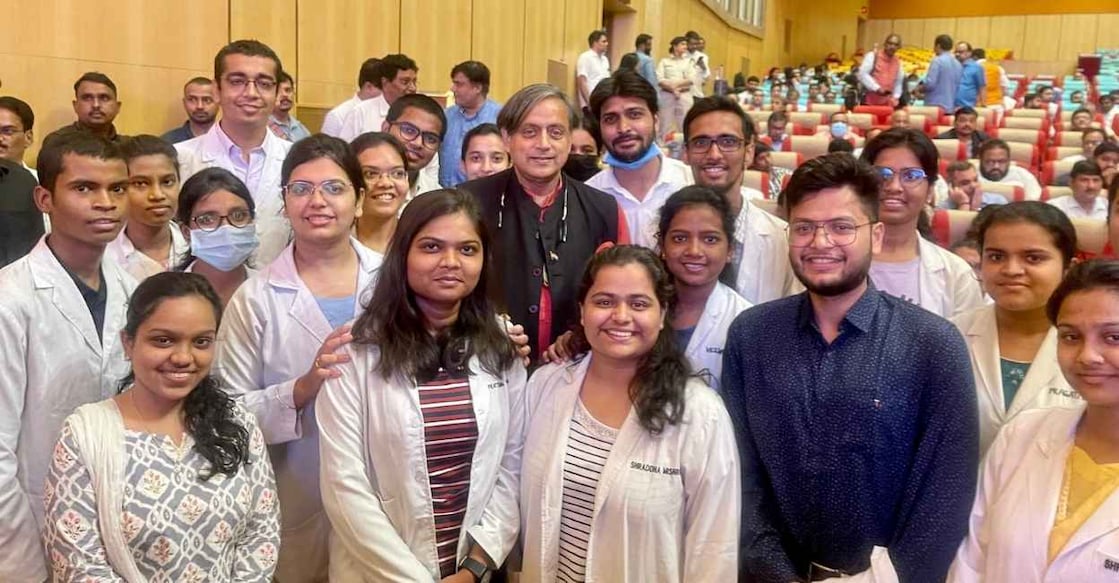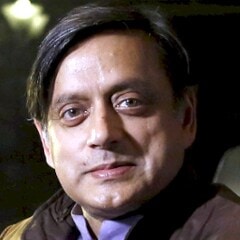Tharoor Line | India's middle class must join politics

Mail This Article
Last weekend, hundreds of professionals from every state in our Union assembled in Raipur, Chhattisgarh, to discuss the urgent problems facing the country. They came from every walk of life – architects, bankers, chartered accountants, doctors, lawyers, scholars and more – and were joined by experts like the brilliant Dr Raghuram Rajan from Chicago and the Centre for Policy Research’s Dr Yamini Aiyar, who shared their insights on India’s most important challenges. This was the National Conclave of the All-India Professionals’ Congress, which I chair, to mark the fifth anniversary of its establishment by the Congress Party.
Before I entered politics myself, one of my more frequent laments had been about the abdication by the Indian educated professional classes of our political responsibility for our country’s destiny. My generation grew up in an India where a vast gulf separated those who went into the professions or the civil services, and those who entered politics. Other than the descendants of those who had led our nation to freedom and who constituted a permanent political establishment, the politicos, at the risk of caricature, were seen as being from either the very top or the very bottom of society: maharajahs or big zamindars with a feudal hold on the allegiances of the voters in their districts, or semi-literate “lumpens” with little to lose, who got into politics as their only means of self-advancement. If you belonged to neither category, as middle-class professionals, you studied hard, took your exams, and made a success of your life on merit – and you steered clear of politics.
But the problem with that approach was that it left out of Indian politics the very group of people that are the mainstay of other democracies. Around the world, the educated taxpaying professional classes are normally the ones who bring values and convictions to a country’s politics, and who have the most direct stake in questions of what government can and cannot do.

Across Europe, for instance, it’s people from the middle-class who set the political agenda: they make up the bulk of the activists, voters and candidates for political office. In most Western democracies, politics is essentially a middle-class pursuit.
India has a highly competitive society where the salaried professional class rarely enjoys the luxury of being able to take the kind of risks that a political life implies.
Our middle-class has neither the time for activism (they’re too busy doing professional jobs to make ends meet), nor the money or the votes to count in politics. The money flows at the top, and the votes, in our stratified society, lie at the bottom, where the numbers are. So members of the educated taxpaying professional class abstain from the process, and all too often look at it with contempt. They don’t show up to vote in large numbers; whereas the poor in India do vote, the middle-class disempowers itself by its disdain.
Yet it is this section of society that is also acutely aware of some of India’s most pressing needs, such as the need for sound and stable governance. They are engaged with an idea of India that is growth-driven and not merely by the divisive politics of religion, caste and community. They demand a sustained increase in the quality of public services paid for by their taxes. Far from the shrill cries of Hindutva and the gau-rakshaks, their priorities are investment in education, healthcare and urban development.
It’s striking that while 12 of the last 16 American Presidential nominees of the two major US political parties were graduates of either Harvard or Yale, the products of our best educational institutions rarely venture into politics. In America, it is widely believed that the skills and determination, drive and energy required to get into a Harvard or Yale are in themselves indicators of suitability for high office. In India, the graduates from our most exclusive universities wouldn’t get elected, and for the most part would consider it beneath themselves to step into the muck and mire of our country's politics.

The attitude of most Indians is that if you're smart enough to get into a good university, you can make something better of your life in a "real" profession. Politics, it is generally muttered amongst the middle-class, is for those who aren't able to do anything else. And the skills required to thrive in the world of Indian politics have nothing to do with the talents honed by a first-class education.
Can India afford the continued “secession of the professionals” from our politics? No – and in the long term, the country’s economic transformation will bring more and more people into the middle and professional classes, which will one day reach the point where its numbers will indeed begin to matter in elections. But do we need to wait till then to ensure that more professionals with skills and qualifications, but no political background, come into politics? When students tell me “I am not interested in politics,” I usually reply, “but politics is interested in you!” Politicians are taking decisions that affect every Indian – how can you stay aloof from it?
The Nobel laureate Archbishop Desmond Tutu, speaking of South Africa, once said he hoped his country would get leaders the people could look up to, “not people we have to keep finding excuses for.” If well-educated, middle-class Indians – the kind of people who are the mainstay of our professions -- want a return to an era when our country’s political leadership was full of people whom the nation admired, they will have to enter the fray themselves. Otherwise, all too often, we will have to pay allegiance to people we need to find excuses for.

My own innings in politics is prefixed by one of the stories of the Indian dream that is common to probably every professional in India. It begins with a child born into a middle-class family, benefiting from the power of education, working hard to enter one of India’s many reputed colleges, graduating from one of the well-known international institutions, and relying on our traditional values of hard work and integrity to build a successful career. My hope is that, in the years to come, the experiment I have led in creating the Professionals’ Congress will be vindicated by the presence of many more educated, professional middle-class Indians in politics – and that will mark our democracy’s salvation.
Time for 'Collector' to go?
In the recent round of IAS transfers in Kerala, Thiruvananthapuram got a new Collector, Geromic George, while his highly effective predecessor, Navjot Khosa, becomes Labour Commissioner. While wishing them both the best, I wonder: isn’t it time we got rid of the outdated British term “Collector”? It comes from the colonial days, when the principal function of the top official in a district was to collect revenue, in other words to extract the last possible penny from suffering Indians. That’s not their work today, nor does it reflect the spirit in which they are meant to work in our democracy. The Collector could easily be renamed “Chief Administrator, X District” which would be a far more accurate reflection of their responsibilities. Shouldn’t Kerala set an example by informing the Centre that it no longer wishes to employ this colonial term?


